Role of Theories of Reflection in Developing Reflective Practices
VerifiedAdded on 2023/01/12
|13
|3425
|76
AI Summary
This article discusses the importance of reflective practices in the health care sector and explores the role of theories of reflection in developing these practices. It examines two reflective models, Kolb's Reflective Model and Gibbs Reflective Theory, and how they can be applied to enhance professional skills. The article also highlights the legislation and codes of practice that endorse reflective practice in the UK.
Contribute Materials
Your contribution can guide someone’s learning journey. Share your
documents today.
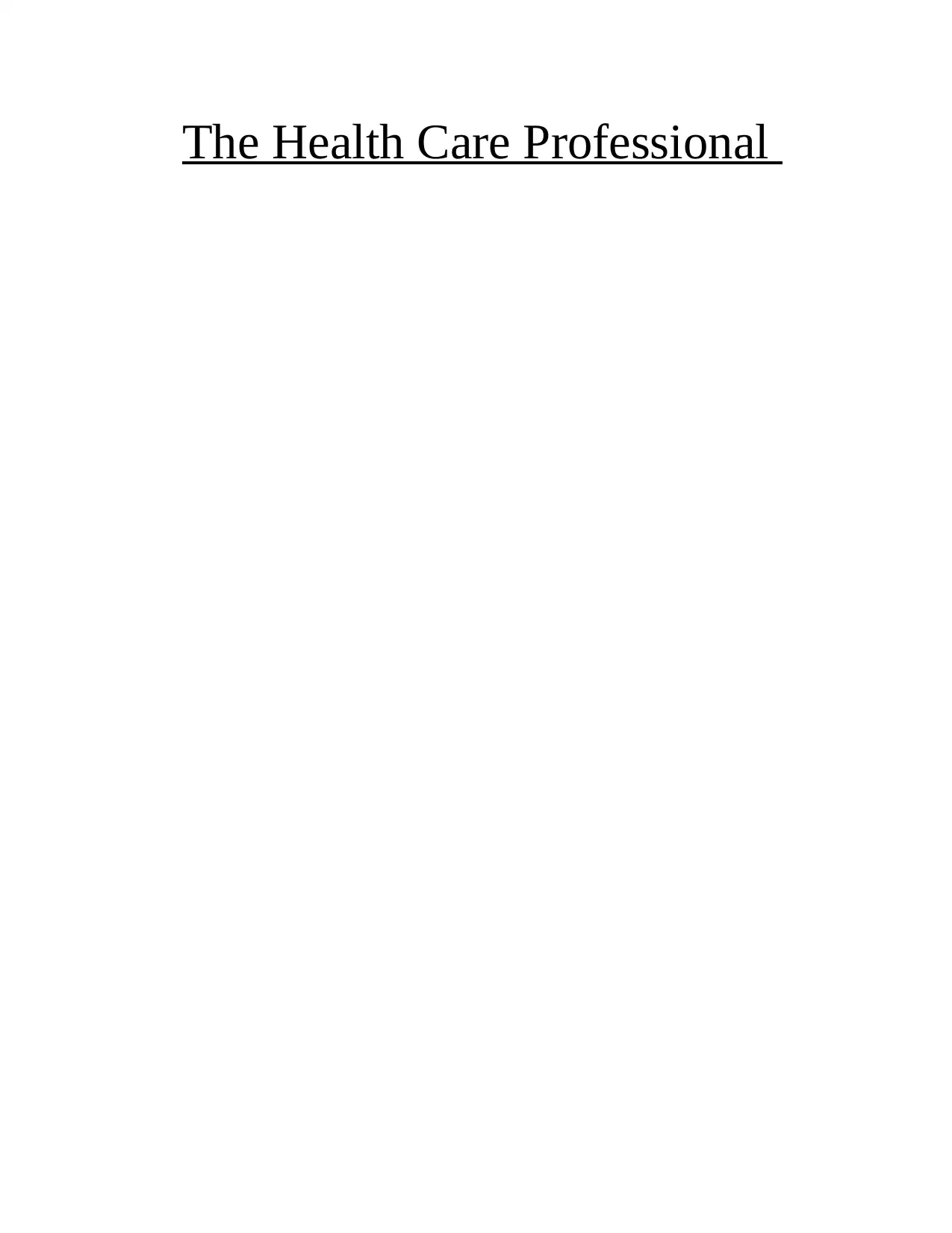
The Health Care Professional
Secure Best Marks with AI Grader
Need help grading? Try our AI Grader for instant feedback on your assignments.
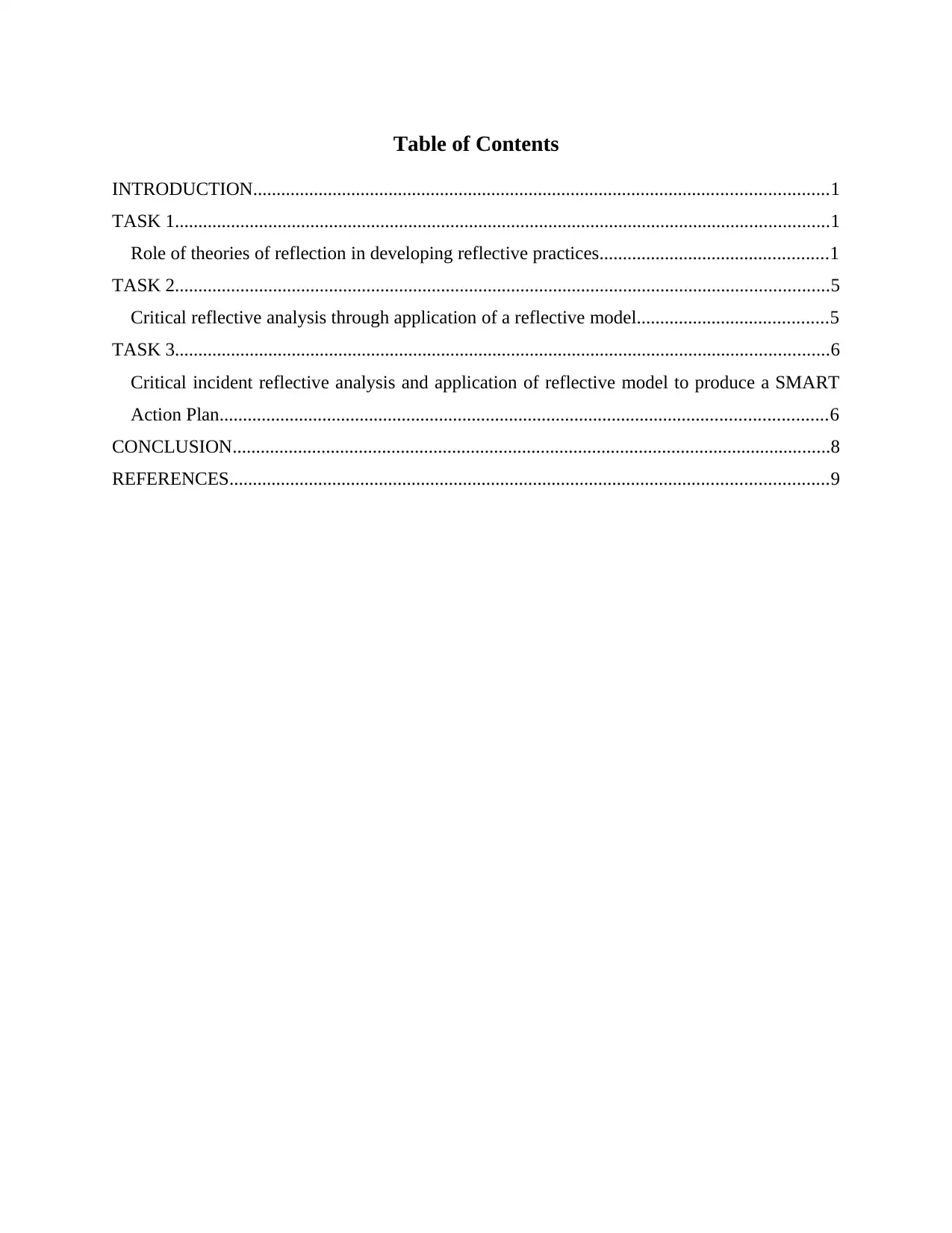
Table of Contents
INTRODUCTION...........................................................................................................................1
TASK 1............................................................................................................................................1
Role of theories of reflection in developing reflective practices.................................................1
TASK 2............................................................................................................................................5
Critical reflective analysis through application of a reflective model.........................................5
TASK 3............................................................................................................................................6
Critical incident reflective analysis and application of reflective model to produce a SMART
Action Plan..................................................................................................................................6
CONCLUSION................................................................................................................................8
REFERENCES................................................................................................................................9
INTRODUCTION...........................................................................................................................1
TASK 1............................................................................................................................................1
Role of theories of reflection in developing reflective practices.................................................1
TASK 2............................................................................................................................................5
Critical reflective analysis through application of a reflective model.........................................5
TASK 3............................................................................................................................................6
Critical incident reflective analysis and application of reflective model to produce a SMART
Action Plan..................................................................................................................................6
CONCLUSION................................................................................................................................8
REFERENCES................................................................................................................................9

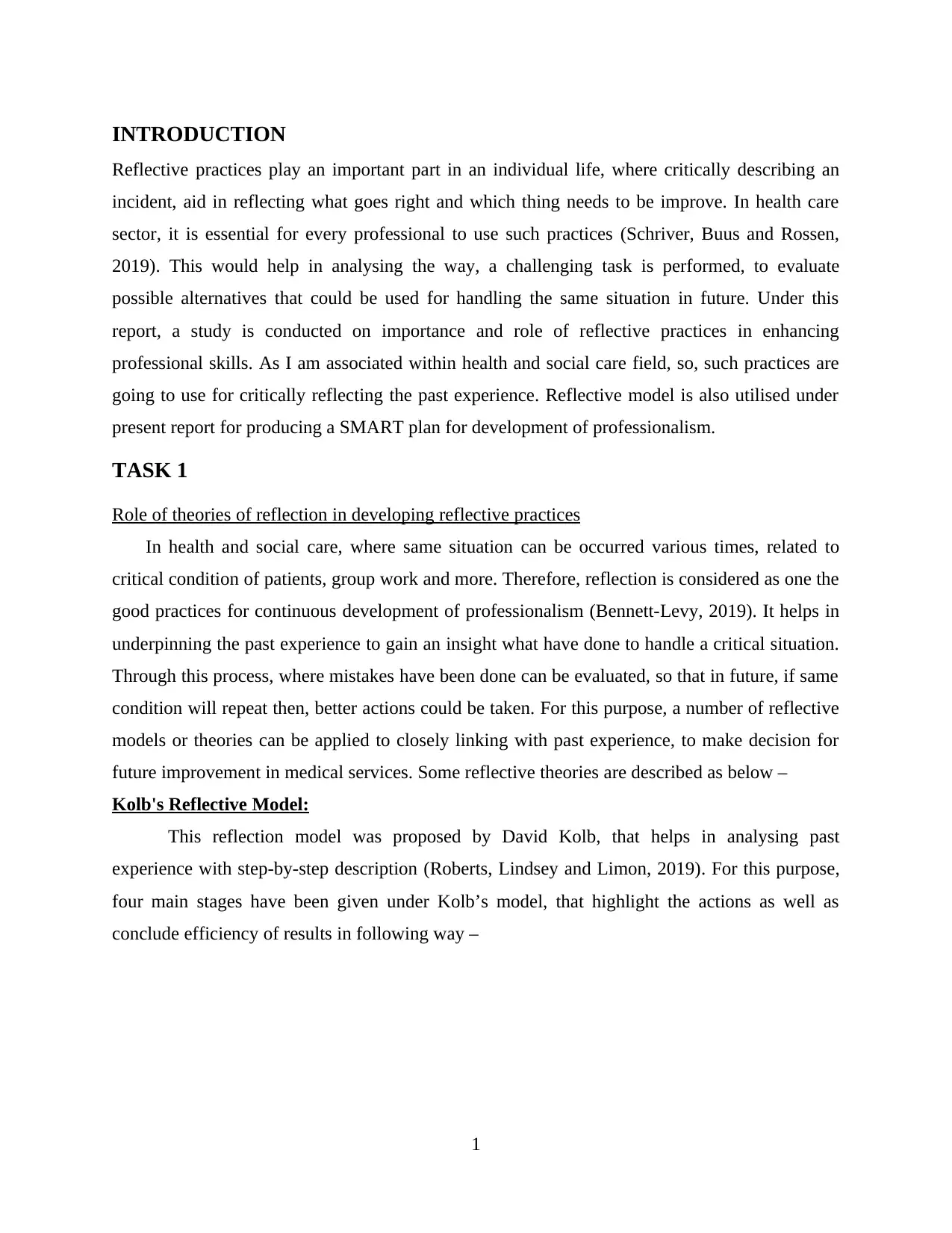
INTRODUCTION
Reflective practices play an important part in an individual life, where critically describing an
incident, aid in reflecting what goes right and which thing needs to be improve. In health care
sector, it is essential for every professional to use such practices (Schriver, Buus and Rossen,
2019). This would help in analysing the way, a challenging task is performed, to evaluate
possible alternatives that could be used for handling the same situation in future. Under this
report, a study is conducted on importance and role of reflective practices in enhancing
professional skills. As I am associated within health and social care field, so, such practices are
going to use for critically reflecting the past experience. Reflective model is also utilised under
present report for producing a SMART plan for development of professionalism.
TASK 1
Role of theories of reflection in developing reflective practices
In health and social care, where same situation can be occurred various times, related to
critical condition of patients, group work and more. Therefore, reflection is considered as one the
good practices for continuous development of professionalism (Bennett-Levy, 2019). It helps in
underpinning the past experience to gain an insight what have done to handle a critical situation.
Through this process, where mistakes have been done can be evaluated, so that in future, if same
condition will repeat then, better actions could be taken. For this purpose, a number of reflective
models or theories can be applied to closely linking with past experience, to make decision for
future improvement in medical services. Some reflective theories are described as below –
Kolb's Reflective Model:
This reflection model was proposed by David Kolb, that helps in analysing past
experience with step-by-step description (Roberts, Lindsey and Limon, 2019). For this purpose,
four main stages have been given under Kolb’s model, that highlight the actions as well as
conclude efficiency of results in following way –
1
Reflective practices play an important part in an individual life, where critically describing an
incident, aid in reflecting what goes right and which thing needs to be improve. In health care
sector, it is essential for every professional to use such practices (Schriver, Buus and Rossen,
2019). This would help in analysing the way, a challenging task is performed, to evaluate
possible alternatives that could be used for handling the same situation in future. Under this
report, a study is conducted on importance and role of reflective practices in enhancing
professional skills. As I am associated within health and social care field, so, such practices are
going to use for critically reflecting the past experience. Reflective model is also utilised under
present report for producing a SMART plan for development of professionalism.
TASK 1
Role of theories of reflection in developing reflective practices
In health and social care, where same situation can be occurred various times, related to
critical condition of patients, group work and more. Therefore, reflection is considered as one the
good practices for continuous development of professionalism (Bennett-Levy, 2019). It helps in
underpinning the past experience to gain an insight what have done to handle a critical situation.
Through this process, where mistakes have been done can be evaluated, so that in future, if same
condition will repeat then, better actions could be taken. For this purpose, a number of reflective
models or theories can be applied to closely linking with past experience, to make decision for
future improvement in medical services. Some reflective theories are described as below –
Kolb's Reflective Model:
This reflection model was proposed by David Kolb, that helps in analysing past
experience with step-by-step description (Roberts, Lindsey and Limon, 2019). For this purpose,
four main stages have been given under Kolb’s model, that highlight the actions as well as
conclude efficiency of results in following way –
1
Secure Best Marks with AI Grader
Need help grading? Try our AI Grader for instant feedback on your assignments.
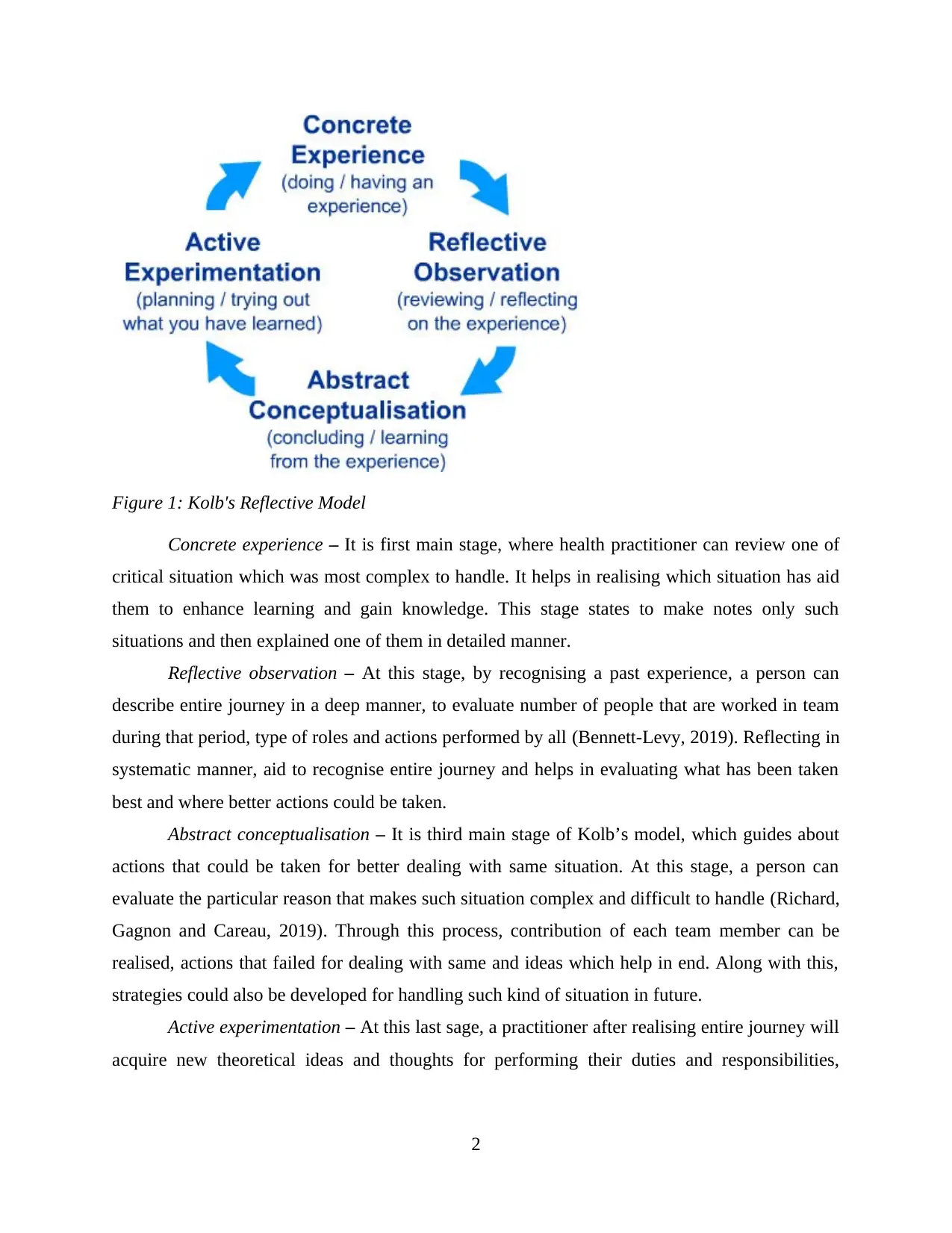
Figure 1: Kolb's Reflective Model
Concrete experience – It is first main stage, where health practitioner can review one of
critical situation which was most complex to handle. It helps in realising which situation has aid
them to enhance learning and gain knowledge. This stage states to make notes only such
situations and then explained one of them in detailed manner.
Reflective observation – At this stage, by recognising a past experience, a person can
describe entire journey in a deep manner, to evaluate number of people that are worked in team
during that period, type of roles and actions performed by all (Bennett-Levy, 2019). Reflecting in
systematic manner, aid to recognise entire journey and helps in evaluating what has been taken
best and where better actions could be taken.
Abstract conceptualisation – It is third main stage of Kolb’s model, which guides about
actions that could be taken for better dealing with same situation. At this stage, a person can
evaluate the particular reason that makes such situation complex and difficult to handle (Richard,
Gagnon and Careau, 2019). Through this process, contribution of each team member can be
realised, actions that failed for dealing with same and ideas which help in end. Along with this,
strategies could also be developed for handling such kind of situation in future.
Active experimentation – At this last sage, a practitioner after realising entire journey will
acquire new theoretical ideas and thoughts for performing their duties and responsibilities,
2
Concrete experience – It is first main stage, where health practitioner can review one of
critical situation which was most complex to handle. It helps in realising which situation has aid
them to enhance learning and gain knowledge. This stage states to make notes only such
situations and then explained one of them in detailed manner.
Reflective observation – At this stage, by recognising a past experience, a person can
describe entire journey in a deep manner, to evaluate number of people that are worked in team
during that period, type of roles and actions performed by all (Bennett-Levy, 2019). Reflecting in
systematic manner, aid to recognise entire journey and helps in evaluating what has been taken
best and where better actions could be taken.
Abstract conceptualisation – It is third main stage of Kolb’s model, which guides about
actions that could be taken for better dealing with same situation. At this stage, a person can
evaluate the particular reason that makes such situation complex and difficult to handle (Richard,
Gagnon and Careau, 2019). Through this process, contribution of each team member can be
realised, actions that failed for dealing with same and ideas which help in end. Along with this,
strategies could also be developed for handling such kind of situation in future.
Active experimentation – At this last sage, a practitioner after realising entire journey will
acquire new theoretical ideas and thoughts for performing their duties and responsibilities,
2
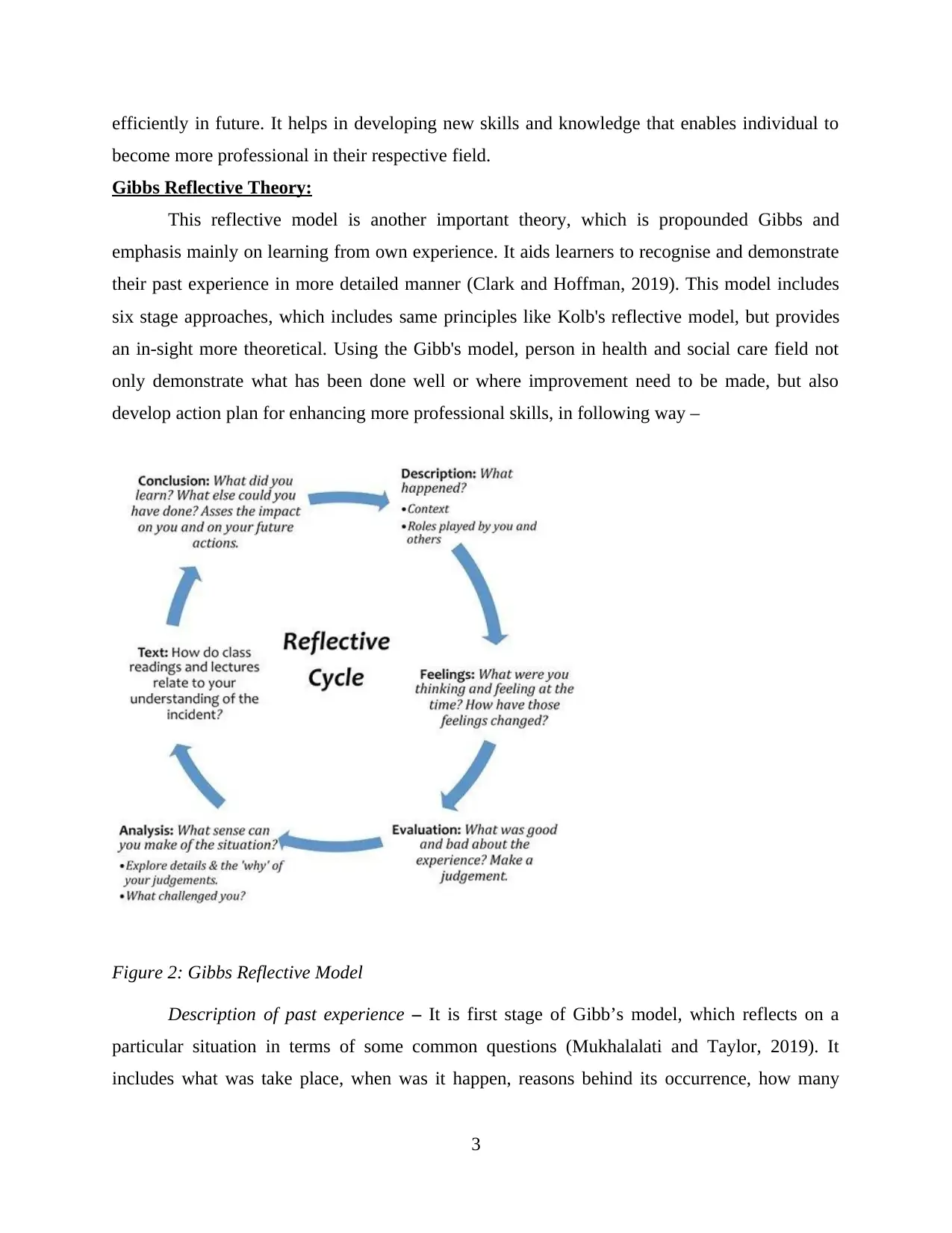
efficiently in future. It helps in developing new skills and knowledge that enables individual to
become more professional in their respective field.
Gibbs Reflective Theory:
This reflective model is another important theory, which is propounded Gibbs and
emphasis mainly on learning from own experience. It aids learners to recognise and demonstrate
their past experience in more detailed manner (Clark and Hoffman, 2019). This model includes
six stage approaches, which includes same principles like Kolb's reflective model, but provides
an in-sight more theoretical. Using the Gibb's model, person in health and social care field not
only demonstrate what has been done well or where improvement need to be made, but also
develop action plan for enhancing more professional skills, in following way –
Figure 2: Gibbs Reflective Model
Description of past experience – It is first stage of Gibb’s model, which reflects on a
particular situation in terms of some common questions (Mukhalalati and Taylor, 2019). It
includes what was take place, when was it happen, reasons behind its occurrence, how many
3
become more professional in their respective field.
Gibbs Reflective Theory:
This reflective model is another important theory, which is propounded Gibbs and
emphasis mainly on learning from own experience. It aids learners to recognise and demonstrate
their past experience in more detailed manner (Clark and Hoffman, 2019). This model includes
six stage approaches, which includes same principles like Kolb's reflective model, but provides
an in-sight more theoretical. Using the Gibb's model, person in health and social care field not
only demonstrate what has been done well or where improvement need to be made, but also
develop action plan for enhancing more professional skills, in following way –
Figure 2: Gibbs Reflective Model
Description of past experience – It is first stage of Gibb’s model, which reflects on a
particular situation in terms of some common questions (Mukhalalati and Taylor, 2019). It
includes what was take place, when was it happen, reasons behind its occurrence, how many
3
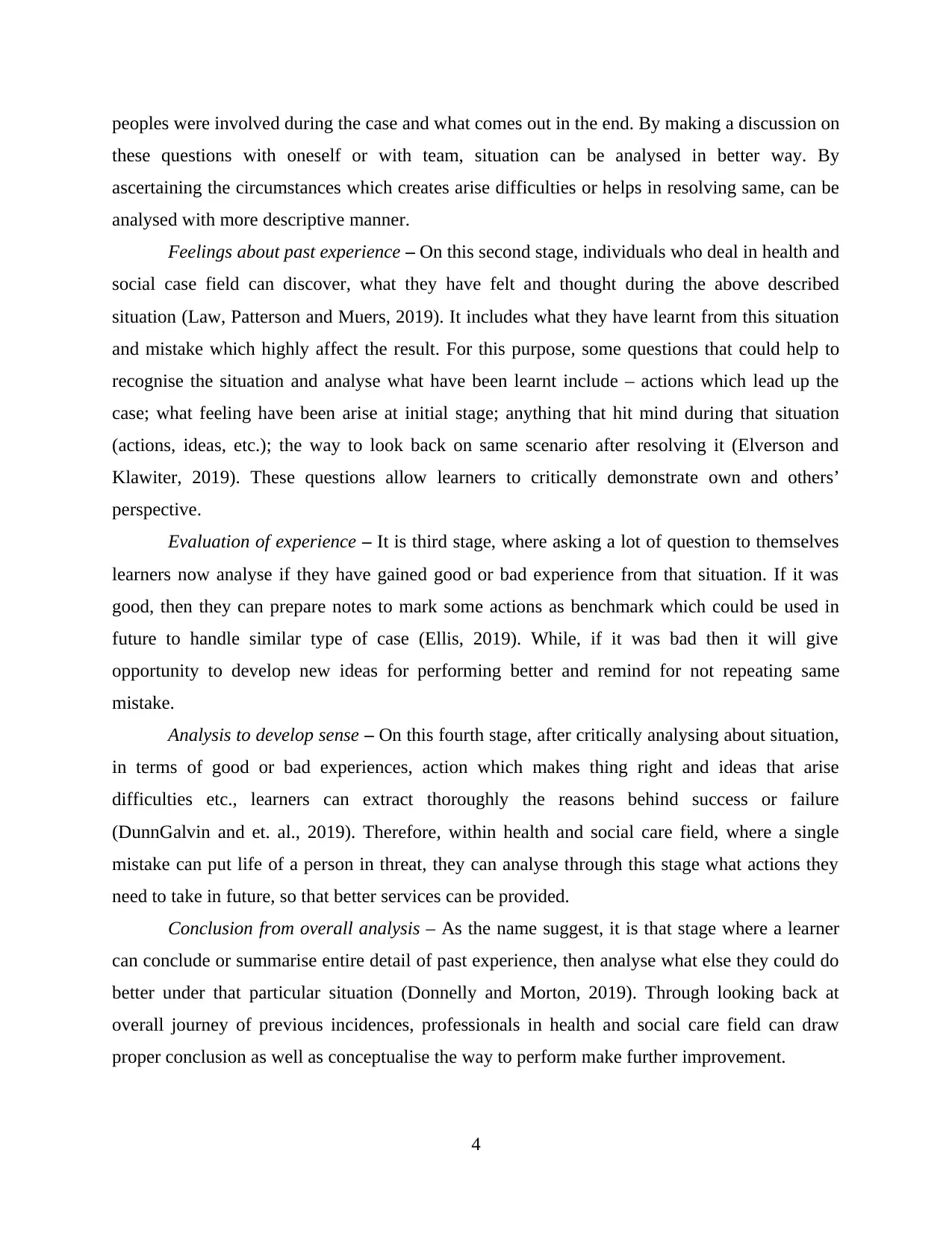
peoples were involved during the case and what comes out in the end. By making a discussion on
these questions with oneself or with team, situation can be analysed in better way. By
ascertaining the circumstances which creates arise difficulties or helps in resolving same, can be
analysed with more descriptive manner.
Feelings about past experience – On this second stage, individuals who deal in health and
social case field can discover, what they have felt and thought during the above described
situation (Law, Patterson and Muers, 2019). It includes what they have learnt from this situation
and mistake which highly affect the result. For this purpose, some questions that could help to
recognise the situation and analyse what have been learnt include – actions which lead up the
case; what feeling have been arise at initial stage; anything that hit mind during that situation
(actions, ideas, etc.); the way to look back on same scenario after resolving it (Elverson and
Klawiter, 2019). These questions allow learners to critically demonstrate own and others’
perspective.
Evaluation of experience – It is third stage, where asking a lot of question to themselves
learners now analyse if they have gained good or bad experience from that situation. If it was
good, then they can prepare notes to mark some actions as benchmark which could be used in
future to handle similar type of case (Ellis, 2019). While, if it was bad then it will give
opportunity to develop new ideas for performing better and remind for not repeating same
mistake.
Analysis to develop sense – On this fourth stage, after critically analysing about situation,
in terms of good or bad experiences, action which makes thing right and ideas that arise
difficulties etc., learners can extract thoroughly the reasons behind success or failure
(DunnGalvin and et. al., 2019). Therefore, within health and social care field, where a single
mistake can put life of a person in threat, they can analyse through this stage what actions they
need to take in future, so that better services can be provided.
Conclusion from overall analysis – As the name suggest, it is that stage where a learner
can conclude or summarise entire detail of past experience, then analyse what else they could do
better under that particular situation (Donnelly and Morton, 2019). Through looking back at
overall journey of previous incidences, professionals in health and social care field can draw
proper conclusion as well as conceptualise the way to perform make further improvement.
4
these questions with oneself or with team, situation can be analysed in better way. By
ascertaining the circumstances which creates arise difficulties or helps in resolving same, can be
analysed with more descriptive manner.
Feelings about past experience – On this second stage, individuals who deal in health and
social case field can discover, what they have felt and thought during the above described
situation (Law, Patterson and Muers, 2019). It includes what they have learnt from this situation
and mistake which highly affect the result. For this purpose, some questions that could help to
recognise the situation and analyse what have been learnt include – actions which lead up the
case; what feeling have been arise at initial stage; anything that hit mind during that situation
(actions, ideas, etc.); the way to look back on same scenario after resolving it (Elverson and
Klawiter, 2019). These questions allow learners to critically demonstrate own and others’
perspective.
Evaluation of experience – It is third stage, where asking a lot of question to themselves
learners now analyse if they have gained good or bad experience from that situation. If it was
good, then they can prepare notes to mark some actions as benchmark which could be used in
future to handle similar type of case (Ellis, 2019). While, if it was bad then it will give
opportunity to develop new ideas for performing better and remind for not repeating same
mistake.
Analysis to develop sense – On this fourth stage, after critically analysing about situation,
in terms of good or bad experiences, action which makes thing right and ideas that arise
difficulties etc., learners can extract thoroughly the reasons behind success or failure
(DunnGalvin and et. al., 2019). Therefore, within health and social care field, where a single
mistake can put life of a person in threat, they can analyse through this stage what actions they
need to take in future, so that better services can be provided.
Conclusion from overall analysis – As the name suggest, it is that stage where a learner
can conclude or summarise entire detail of past experience, then analyse what else they could do
better under that particular situation (Donnelly and Morton, 2019). Through looking back at
overall journey of previous incidences, professionals in health and social care field can draw
proper conclusion as well as conceptualise the way to perform make further improvement.
4
Paraphrase This Document
Need a fresh take? Get an instant paraphrase of this document with our AI Paraphraser
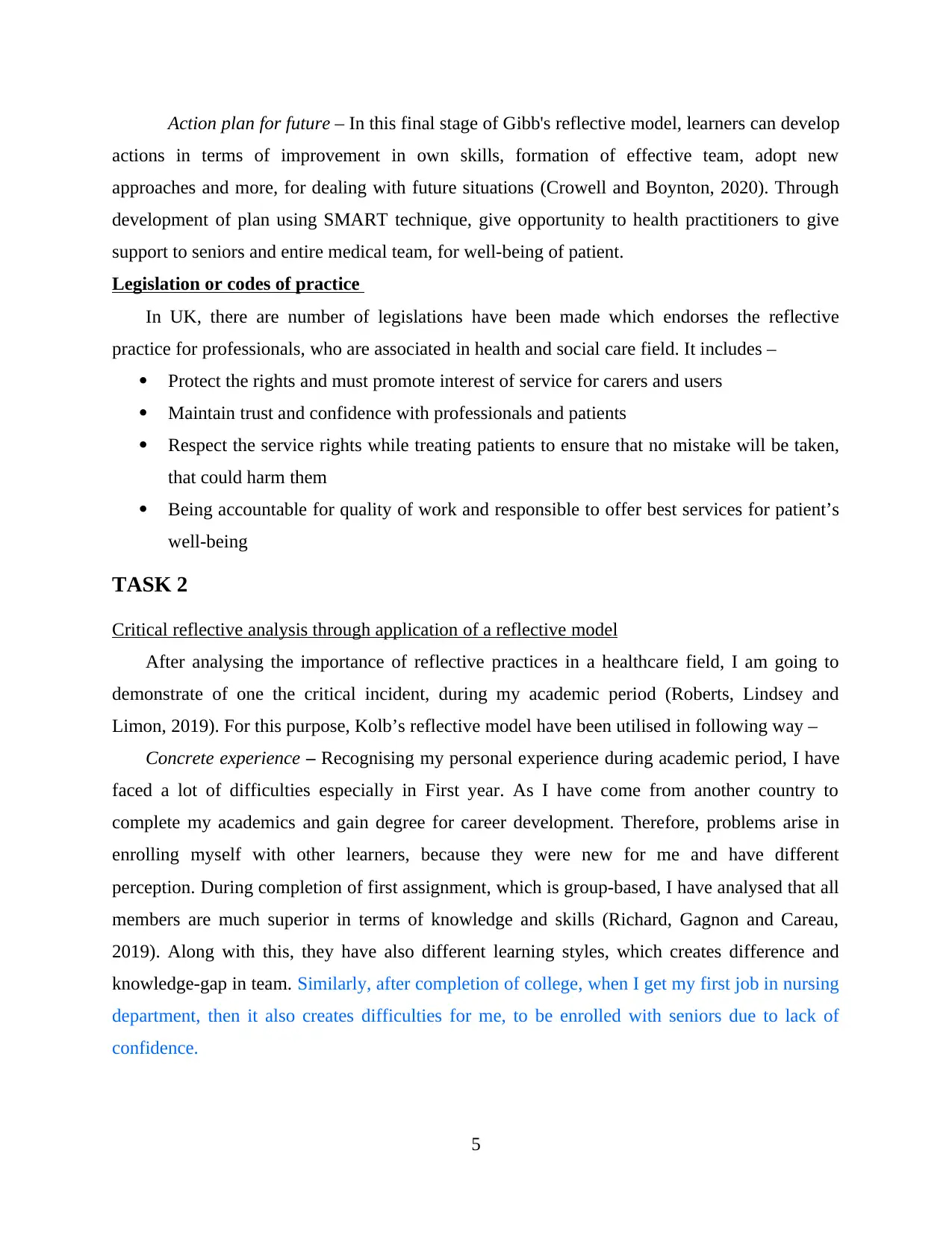
Action plan for future – In this final stage of Gibb's reflective model, learners can develop
actions in terms of improvement in own skills, formation of effective team, adopt new
approaches and more, for dealing with future situations (Crowell and Boynton, 2020). Through
development of plan using SMART technique, give opportunity to health practitioners to give
support to seniors and entire medical team, for well-being of patient.
Legislation or codes of practice
In UK, there are number of legislations have been made which endorses the reflective
practice for professionals, who are associated in health and social care field. It includes –
Protect the rights and must promote interest of service for carers and users
Maintain trust and confidence with professionals and patients
Respect the service rights while treating patients to ensure that no mistake will be taken,
that could harm them
Being accountable for quality of work and responsible to offer best services for patient’s
well-being
TASK 2
Critical reflective analysis through application of a reflective model
After analysing the importance of reflective practices in a healthcare field, I am going to
demonstrate of one the critical incident, during my academic period (Roberts, Lindsey and
Limon, 2019). For this purpose, Kolb’s reflective model have been utilised in following way –
Concrete experience – Recognising my personal experience during academic period, I have
faced a lot of difficulties especially in First year. As I have come from another country to
complete my academics and gain degree for career development. Therefore, problems arise in
enrolling myself with other learners, because they were new for me and have different
perception. During completion of first assignment, which is group-based, I have analysed that all
members are much superior in terms of knowledge and skills (Richard, Gagnon and Careau,
2019). Along with this, they have also different learning styles, which creates difference and
knowledge-gap in team. Similarly, after completion of college, when I get my first job in nursing
department, then it also creates difficulties for me, to be enrolled with seniors due to lack of
confidence.
5
actions in terms of improvement in own skills, formation of effective team, adopt new
approaches and more, for dealing with future situations (Crowell and Boynton, 2020). Through
development of plan using SMART technique, give opportunity to health practitioners to give
support to seniors and entire medical team, for well-being of patient.
Legislation or codes of practice
In UK, there are number of legislations have been made which endorses the reflective
practice for professionals, who are associated in health and social care field. It includes –
Protect the rights and must promote interest of service for carers and users
Maintain trust and confidence with professionals and patients
Respect the service rights while treating patients to ensure that no mistake will be taken,
that could harm them
Being accountable for quality of work and responsible to offer best services for patient’s
well-being
TASK 2
Critical reflective analysis through application of a reflective model
After analysing the importance of reflective practices in a healthcare field, I am going to
demonstrate of one the critical incident, during my academic period (Roberts, Lindsey and
Limon, 2019). For this purpose, Kolb’s reflective model have been utilised in following way –
Concrete experience – Recognising my personal experience during academic period, I have
faced a lot of difficulties especially in First year. As I have come from another country to
complete my academics and gain degree for career development. Therefore, problems arise in
enrolling myself with other learners, because they were new for me and have different
perception. During completion of first assignment, which is group-based, I have analysed that all
members are much superior in terms of knowledge and skills (Richard, Gagnon and Careau,
2019). Along with this, they have also different learning styles, which creates difference and
knowledge-gap in team. Similarly, after completion of college, when I get my first job in nursing
department, then it also creates difficulties for me, to be enrolled with seniors due to lack of
confidence.
5
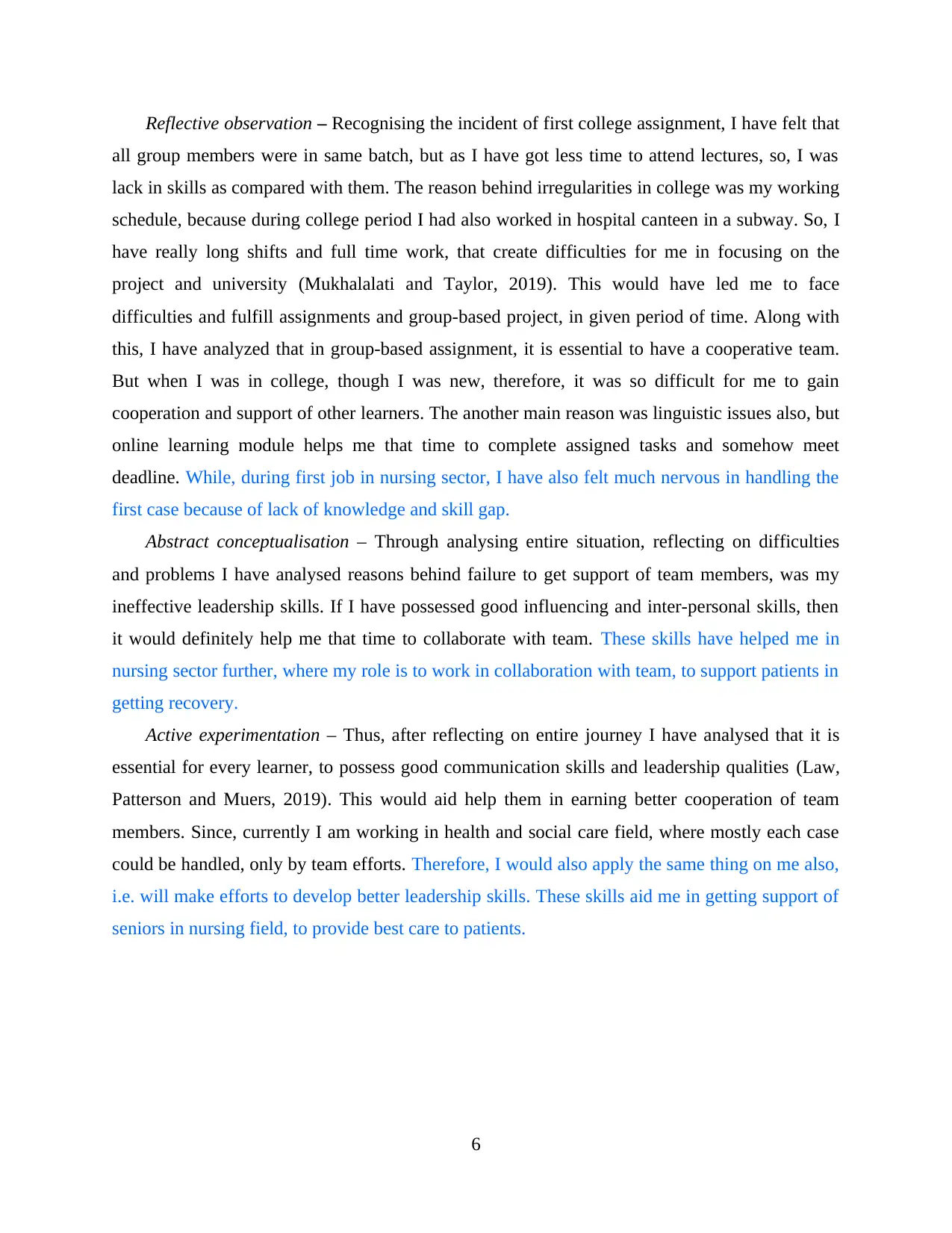
Reflective observation – Recognising the incident of first college assignment, I have felt that
all group members were in same batch, but as I have got less time to attend lectures, so, I was
lack in skills as compared with them. The reason behind irregularities in college was my working
schedule, because during college period I had also worked in hospital canteen in a subway. So, I
have really long shifts and full time work, that create difficulties for me in focusing on the
project and university (Mukhalalati and Taylor, 2019). This would have led me to face
difficulties and fulfill assignments and group-based project, in given period of time. Along with
this, I have analyzed that in group-based assignment, it is essential to have a cooperative team.
But when I was in college, though I was new, therefore, it was so difficult for me to gain
cooperation and support of other learners. The another main reason was linguistic issues also, but
online learning module helps me that time to complete assigned tasks and somehow meet
deadline. While, during first job in nursing sector, I have also felt much nervous in handling the
first case because of lack of knowledge and skill gap.
Abstract conceptualisation – Through analysing entire situation, reflecting on difficulties
and problems I have analysed reasons behind failure to get support of team members, was my
ineffective leadership skills. If I have possessed good influencing and inter-personal skills, then
it would definitely help me that time to collaborate with team. These skills have helped me in
nursing sector further, where my role is to work in collaboration with team, to support patients in
getting recovery.
Active experimentation – Thus, after reflecting on entire journey I have analysed that it is
essential for every learner, to possess good communication skills and leadership qualities (Law,
Patterson and Muers, 2019). This would aid help them in earning better cooperation of team
members. Since, currently I am working in health and social care field, where mostly each case
could be handled, only by team efforts. Therefore, I would also apply the same thing on me also,
i.e. will make efforts to develop better leadership skills. These skills aid me in getting support of
seniors in nursing field, to provide best care to patients.
6
all group members were in same batch, but as I have got less time to attend lectures, so, I was
lack in skills as compared with them. The reason behind irregularities in college was my working
schedule, because during college period I had also worked in hospital canteen in a subway. So, I
have really long shifts and full time work, that create difficulties for me in focusing on the
project and university (Mukhalalati and Taylor, 2019). This would have led me to face
difficulties and fulfill assignments and group-based project, in given period of time. Along with
this, I have analyzed that in group-based assignment, it is essential to have a cooperative team.
But when I was in college, though I was new, therefore, it was so difficult for me to gain
cooperation and support of other learners. The another main reason was linguistic issues also, but
online learning module helps me that time to complete assigned tasks and somehow meet
deadline. While, during first job in nursing sector, I have also felt much nervous in handling the
first case because of lack of knowledge and skill gap.
Abstract conceptualisation – Through analysing entire situation, reflecting on difficulties
and problems I have analysed reasons behind failure to get support of team members, was my
ineffective leadership skills. If I have possessed good influencing and inter-personal skills, then
it would definitely help me that time to collaborate with team. These skills have helped me in
nursing sector further, where my role is to work in collaboration with team, to support patients in
getting recovery.
Active experimentation – Thus, after reflecting on entire journey I have analysed that it is
essential for every learner, to possess good communication skills and leadership qualities (Law,
Patterson and Muers, 2019). This would aid help them in earning better cooperation of team
members. Since, currently I am working in health and social care field, where mostly each case
could be handled, only by team efforts. Therefore, I would also apply the same thing on me also,
i.e. will make efforts to develop better leadership skills. These skills aid me in getting support of
seniors in nursing field, to provide best care to patients.
6
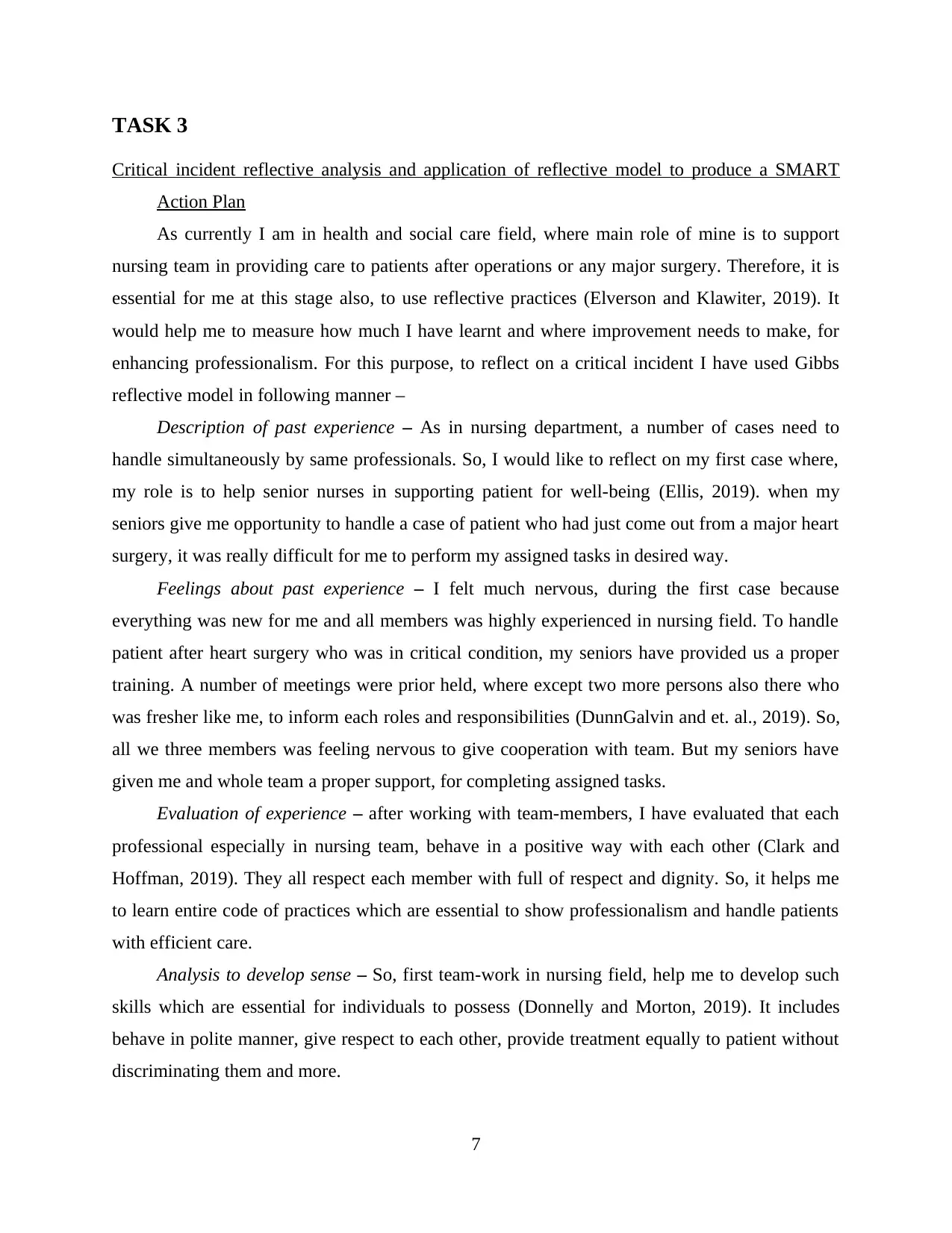
TASK 3
Critical incident reflective analysis and application of reflective model to produce a SMART
Action Plan
As currently I am in health and social care field, where main role of mine is to support
nursing team in providing care to patients after operations or any major surgery. Therefore, it is
essential for me at this stage also, to use reflective practices (Elverson and Klawiter, 2019). It
would help me to measure how much I have learnt and where improvement needs to make, for
enhancing professionalism. For this purpose, to reflect on a critical incident I have used Gibbs
reflective model in following manner –
Description of past experience – As in nursing department, a number of cases need to
handle simultaneously by same professionals. So, I would like to reflect on my first case where,
my role is to help senior nurses in supporting patient for well-being (Ellis, 2019). when my
seniors give me opportunity to handle a case of patient who had just come out from a major heart
surgery, it was really difficult for me to perform my assigned tasks in desired way.
Feelings about past experience – I felt much nervous, during the first case because
everything was new for me and all members was highly experienced in nursing field. To handle
patient after heart surgery who was in critical condition, my seniors have provided us a proper
training. A number of meetings were prior held, where except two more persons also there who
was fresher like me, to inform each roles and responsibilities (DunnGalvin and et. al., 2019). So,
all we three members was feeling nervous to give cooperation with team. But my seniors have
given me and whole team a proper support, for completing assigned tasks.
Evaluation of experience – after working with team-members, I have evaluated that each
professional especially in nursing team, behave in a positive way with each other (Clark and
Hoffman, 2019). They all respect each member with full of respect and dignity. So, it helps me
to learn entire code of practices which are essential to show professionalism and handle patients
with efficient care.
Analysis to develop sense – So, first team-work in nursing field, help me to develop such
skills which are essential for individuals to possess (Donnelly and Morton, 2019). It includes
behave in polite manner, give respect to each other, provide treatment equally to patient without
discriminating them and more.
7
Critical incident reflective analysis and application of reflective model to produce a SMART
Action Plan
As currently I am in health and social care field, where main role of mine is to support
nursing team in providing care to patients after operations or any major surgery. Therefore, it is
essential for me at this stage also, to use reflective practices (Elverson and Klawiter, 2019). It
would help me to measure how much I have learnt and where improvement needs to make, for
enhancing professionalism. For this purpose, to reflect on a critical incident I have used Gibbs
reflective model in following manner –
Description of past experience – As in nursing department, a number of cases need to
handle simultaneously by same professionals. So, I would like to reflect on my first case where,
my role is to help senior nurses in supporting patient for well-being (Ellis, 2019). when my
seniors give me opportunity to handle a case of patient who had just come out from a major heart
surgery, it was really difficult for me to perform my assigned tasks in desired way.
Feelings about past experience – I felt much nervous, during the first case because
everything was new for me and all members was highly experienced in nursing field. To handle
patient after heart surgery who was in critical condition, my seniors have provided us a proper
training. A number of meetings were prior held, where except two more persons also there who
was fresher like me, to inform each roles and responsibilities (DunnGalvin and et. al., 2019). So,
all we three members was feeling nervous to give cooperation with team. But my seniors have
given me and whole team a proper support, for completing assigned tasks.
Evaluation of experience – after working with team-members, I have evaluated that each
professional especially in nursing team, behave in a positive way with each other (Clark and
Hoffman, 2019). They all respect each member with full of respect and dignity. So, it helps me
to learn entire code of practices which are essential to show professionalism and handle patients
with efficient care.
Analysis to develop sense – So, first team-work in nursing field, help me to develop such
skills which are essential for individuals to possess (Donnelly and Morton, 2019). It includes
behave in polite manner, give respect to each other, provide treatment equally to patient without
discriminating them and more.
7
Secure Best Marks with AI Grader
Need help grading? Try our AI Grader for instant feedback on your assignments.
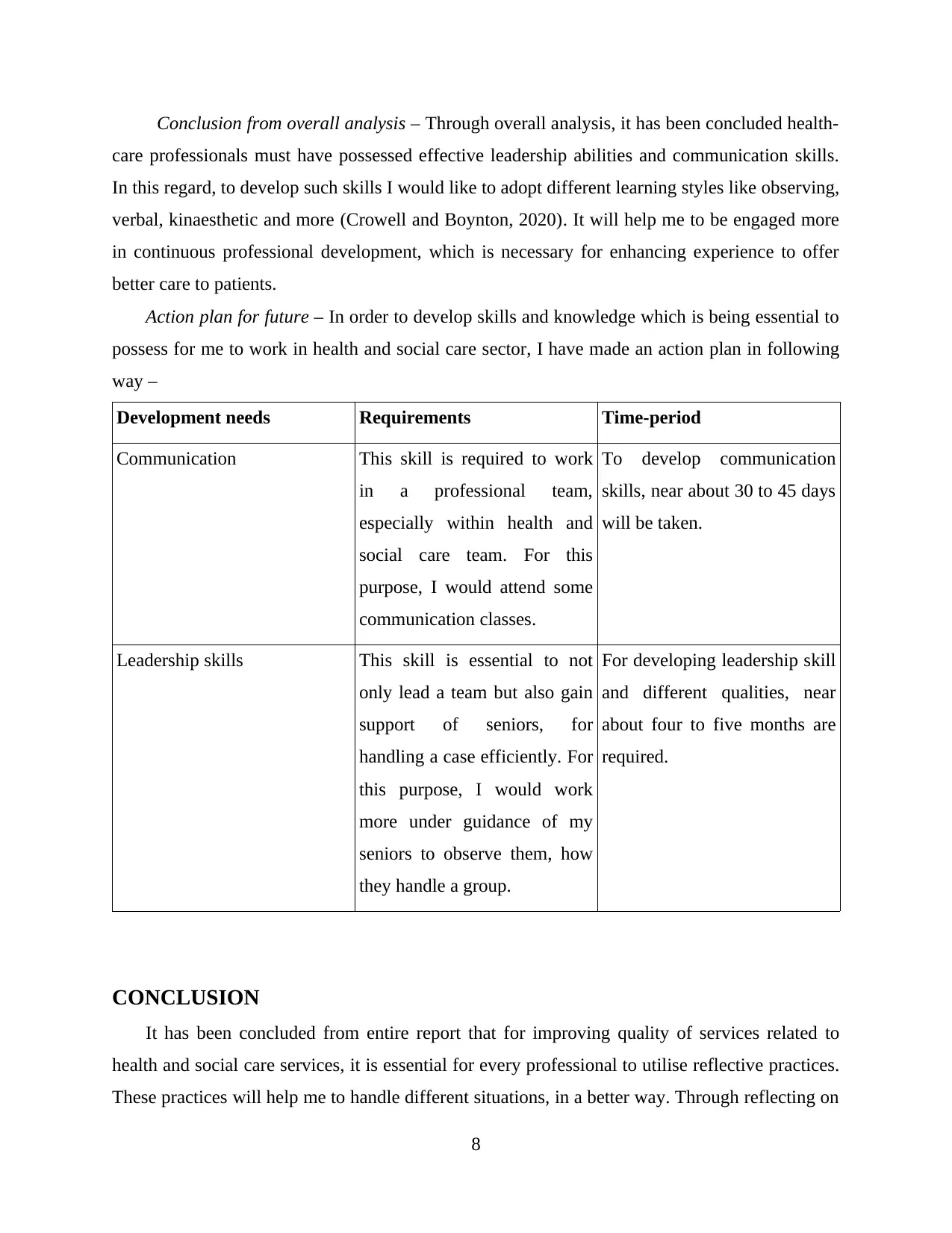
Conclusion from overall analysis – Through overall analysis, it has been concluded health-
care professionals must have possessed effective leadership abilities and communication skills.
In this regard, to develop such skills I would like to adopt different learning styles like observing,
verbal, kinaesthetic and more (Crowell and Boynton, 2020). It will help me to be engaged more
in continuous professional development, which is necessary for enhancing experience to offer
better care to patients.
Action plan for future – In order to develop skills and knowledge which is being essential to
possess for me to work in health and social care sector, I have made an action plan in following
way –
Development needs Requirements Time-period
Communication This skill is required to work
in a professional team,
especially within health and
social care team. For this
purpose, I would attend some
communication classes.
To develop communication
skills, near about 30 to 45 days
will be taken.
Leadership skills This skill is essential to not
only lead a team but also gain
support of seniors, for
handling a case efficiently. For
this purpose, I would work
more under guidance of my
seniors to observe them, how
they handle a group.
For developing leadership skill
and different qualities, near
about four to five months are
required.
CONCLUSION
It has been concluded from entire report that for improving quality of services related to
health and social care services, it is essential for every professional to utilise reflective practices.
These practices will help me to handle different situations, in a better way. Through reflecting on
8
care professionals must have possessed effective leadership abilities and communication skills.
In this regard, to develop such skills I would like to adopt different learning styles like observing,
verbal, kinaesthetic and more (Crowell and Boynton, 2020). It will help me to be engaged more
in continuous professional development, which is necessary for enhancing experience to offer
better care to patients.
Action plan for future – In order to develop skills and knowledge which is being essential to
possess for me to work in health and social care sector, I have made an action plan in following
way –
Development needs Requirements Time-period
Communication This skill is required to work
in a professional team,
especially within health and
social care team. For this
purpose, I would attend some
communication classes.
To develop communication
skills, near about 30 to 45 days
will be taken.
Leadership skills This skill is essential to not
only lead a team but also gain
support of seniors, for
handling a case efficiently. For
this purpose, I would work
more under guidance of my
seniors to observe them, how
they handle a group.
For developing leadership skill
and different qualities, near
about four to five months are
required.
CONCLUSION
It has been concluded from entire report that for improving quality of services related to
health and social care services, it is essential for every professional to utilise reflective practices.
These practices will help me to handle different situations, in a better way. Through reflecting on
8
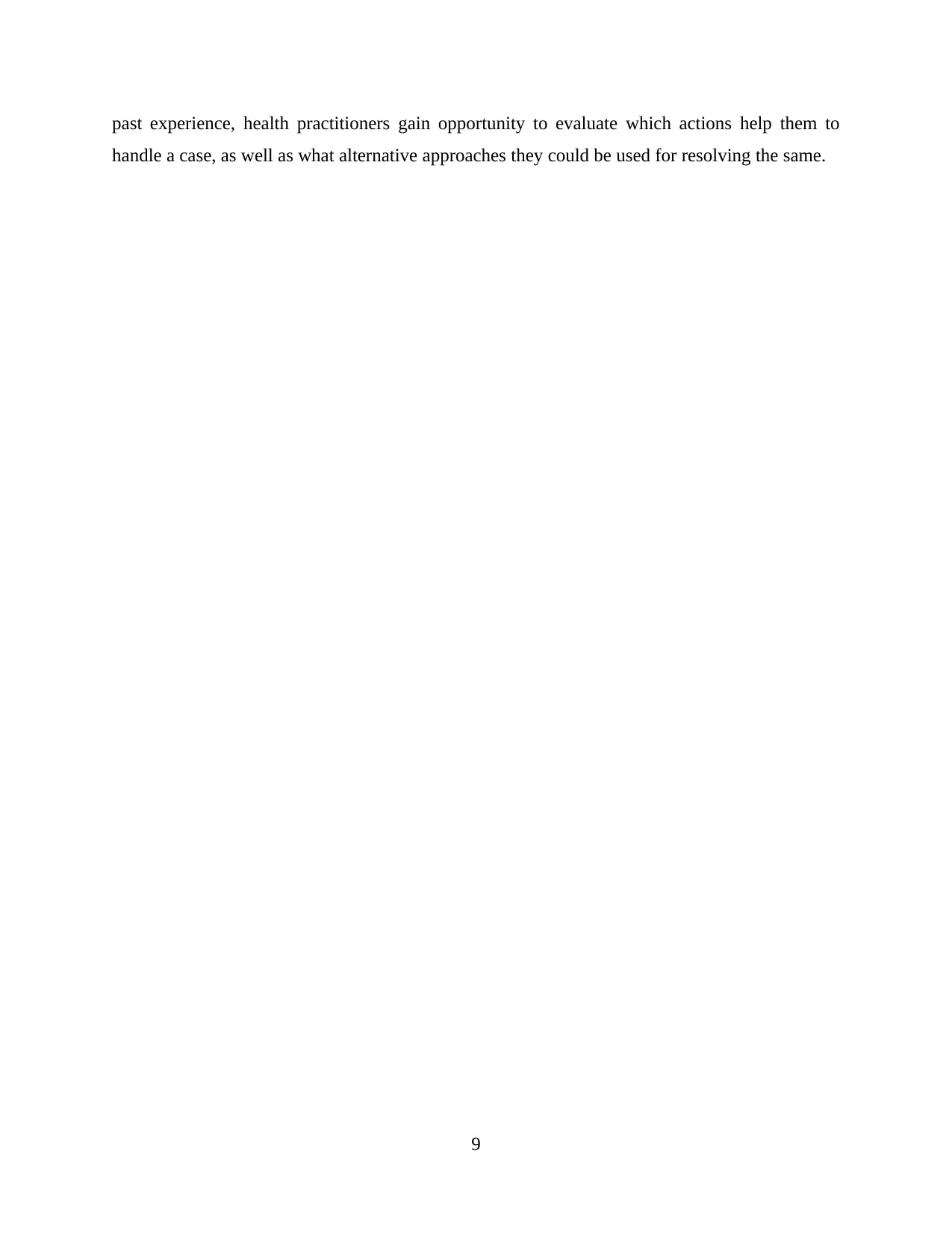
past experience, health practitioners gain opportunity to evaluate which actions help them to
handle a case, as well as what alternative approaches they could be used for resolving the same.
9
handle a case, as well as what alternative approaches they could be used for resolving the same.
9
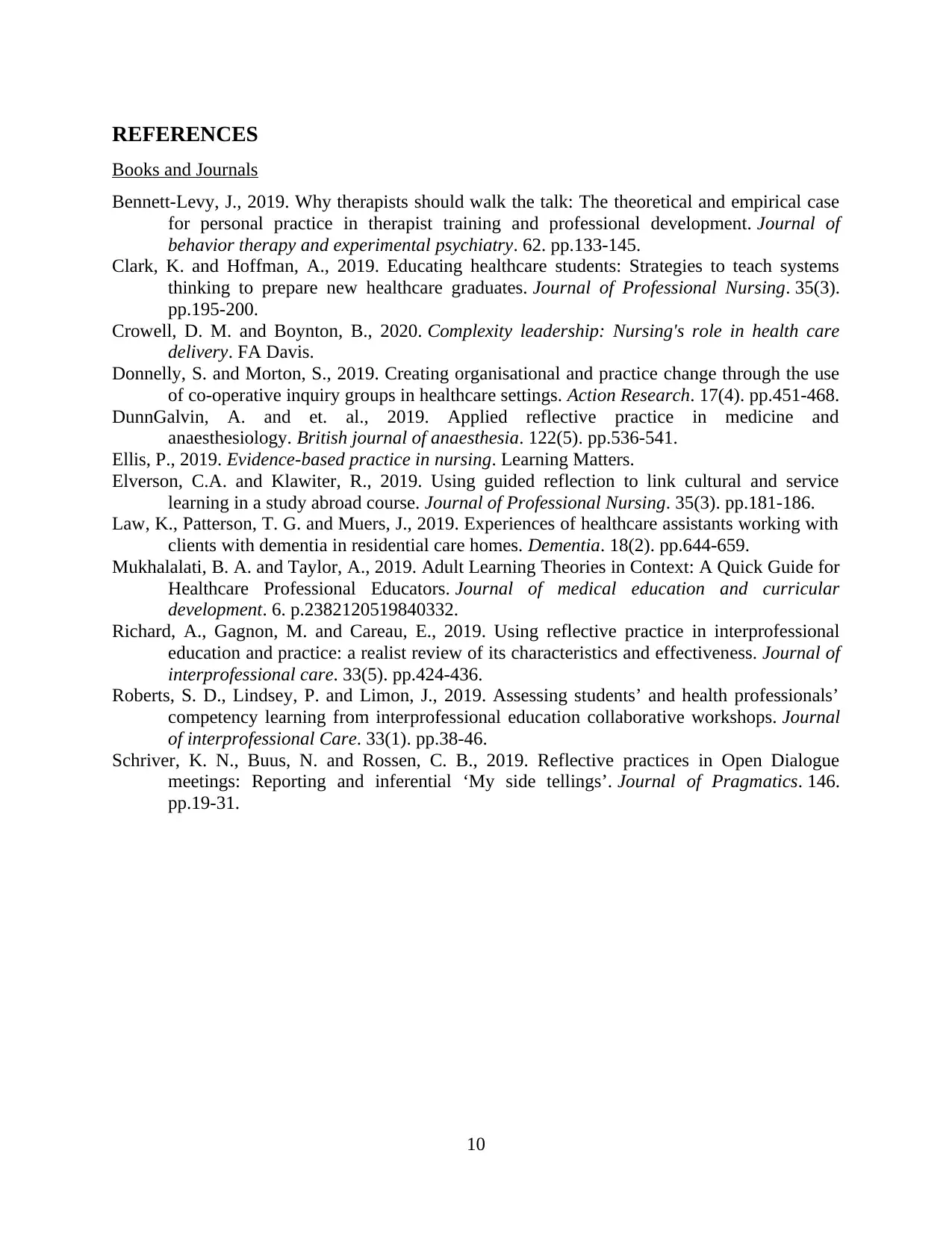
REFERENCES
Books and Journals
Bennett-Levy, J., 2019. Why therapists should walk the talk: The theoretical and empirical case
for personal practice in therapist training and professional development. Journal of
behavior therapy and experimental psychiatry. 62. pp.133-145.
Clark, K. and Hoffman, A., 2019. Educating healthcare students: Strategies to teach systems
thinking to prepare new healthcare graduates. Journal of Professional Nursing. 35(3).
pp.195-200.
Crowell, D. M. and Boynton, B., 2020. Complexity leadership: Nursing's role in health care
delivery. FA Davis.
Donnelly, S. and Morton, S., 2019. Creating organisational and practice change through the use
of co-operative inquiry groups in healthcare settings. Action Research. 17(4). pp.451-468.
DunnGalvin, A. and et. al., 2019. Applied reflective practice in medicine and
anaesthesiology. British journal of anaesthesia. 122(5). pp.536-541.
Ellis, P., 2019. Evidence-based practice in nursing. Learning Matters.
Elverson, C.A. and Klawiter, R., 2019. Using guided reflection to link cultural and service
learning in a study abroad course. Journal of Professional Nursing. 35(3). pp.181-186.
Law, K., Patterson, T. G. and Muers, J., 2019. Experiences of healthcare assistants working with
clients with dementia in residential care homes. Dementia. 18(2). pp.644-659.
Mukhalalati, B. A. and Taylor, A., 2019. Adult Learning Theories in Context: A Quick Guide for
Healthcare Professional Educators. Journal of medical education and curricular
development. 6. p.2382120519840332.
Richard, A., Gagnon, M. and Careau, E., 2019. Using reflective practice in interprofessional
education and practice: a realist review of its characteristics and effectiveness. Journal of
interprofessional care. 33(5). pp.424-436.
Roberts, S. D., Lindsey, P. and Limon, J., 2019. Assessing students’ and health professionals’
competency learning from interprofessional education collaborative workshops. Journal
of interprofessional Care. 33(1). pp.38-46.
Schriver, K. N., Buus, N. and Rossen, C. B., 2019. Reflective practices in Open Dialogue
meetings: Reporting and inferential ‘My side tellings’. Journal of Pragmatics. 146.
pp.19-31.
10
Books and Journals
Bennett-Levy, J., 2019. Why therapists should walk the talk: The theoretical and empirical case
for personal practice in therapist training and professional development. Journal of
behavior therapy and experimental psychiatry. 62. pp.133-145.
Clark, K. and Hoffman, A., 2019. Educating healthcare students: Strategies to teach systems
thinking to prepare new healthcare graduates. Journal of Professional Nursing. 35(3).
pp.195-200.
Crowell, D. M. and Boynton, B., 2020. Complexity leadership: Nursing's role in health care
delivery. FA Davis.
Donnelly, S. and Morton, S., 2019. Creating organisational and practice change through the use
of co-operative inquiry groups in healthcare settings. Action Research. 17(4). pp.451-468.
DunnGalvin, A. and et. al., 2019. Applied reflective practice in medicine and
anaesthesiology. British journal of anaesthesia. 122(5). pp.536-541.
Ellis, P., 2019. Evidence-based practice in nursing. Learning Matters.
Elverson, C.A. and Klawiter, R., 2019. Using guided reflection to link cultural and service
learning in a study abroad course. Journal of Professional Nursing. 35(3). pp.181-186.
Law, K., Patterson, T. G. and Muers, J., 2019. Experiences of healthcare assistants working with
clients with dementia in residential care homes. Dementia. 18(2). pp.644-659.
Mukhalalati, B. A. and Taylor, A., 2019. Adult Learning Theories in Context: A Quick Guide for
Healthcare Professional Educators. Journal of medical education and curricular
development. 6. p.2382120519840332.
Richard, A., Gagnon, M. and Careau, E., 2019. Using reflective practice in interprofessional
education and practice: a realist review of its characteristics and effectiveness. Journal of
interprofessional care. 33(5). pp.424-436.
Roberts, S. D., Lindsey, P. and Limon, J., 2019. Assessing students’ and health professionals’
competency learning from interprofessional education collaborative workshops. Journal
of interprofessional Care. 33(1). pp.38-46.
Schriver, K. N., Buus, N. and Rossen, C. B., 2019. Reflective practices in Open Dialogue
meetings: Reporting and inferential ‘My side tellings’. Journal of Pragmatics. 146.
pp.19-31.
10
1 out of 13
Related Documents
Your All-in-One AI-Powered Toolkit for Academic Success.
+13062052269
info@desklib.com
Available 24*7 on WhatsApp / Email
![[object Object]](/_next/static/media/star-bottom.7253800d.svg)
Unlock your academic potential
© 2024 | Zucol Services PVT LTD | All rights reserved.





